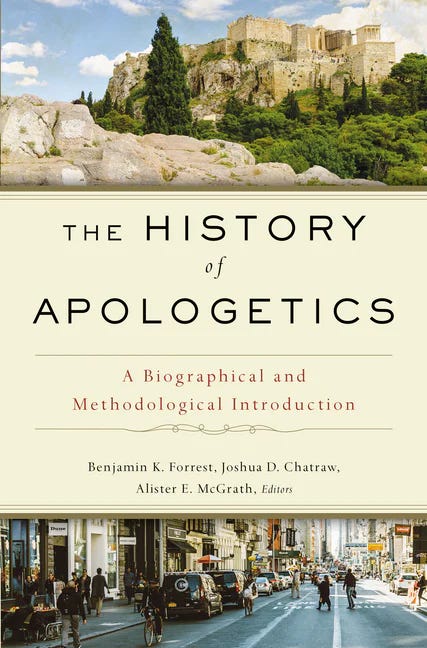Top 30 Apologetics Books (#20): Gordon H. Clark, The Philosophy of Science and Belief in God
By Rob Bowman | Plus, Francis Schaeffer's Apologetics Methodology
Note: Below, Dr. Rob Bowman continues his series on the 30 most important apologetics books in church history. See his earlier posts in previous weeks of our weekly emails.
#20: Gordon H. Clark, The Philosophy of Science and Belief in God (1964)
Gordon H. Clark (1902–1985) is one of the two most influential advocates of a presuppositional approach to apologetics, the other being Cornelius Van Til, whom we introduced earlier. From 1945 to 1973, Clark was chairman of the philosophy department at Butler University in Indianapolis.
Clark’s deductive presuppositionalism is subtly but significantly different from Van Til’s. According to Van Til, truth is found everywhere in God’s world, but this truth can be known only because God has given us the capacity to know it. By contrast, Clark maintained that all that could truly be known was to be found in Scripture itself. In his view, knowledge of truth requires deductive proof, and nothing can be deduced from the uncertain facts of the natural world or of the human mind. Furthermore, inductive reasoning is unreliable, because inductive arguments are formally fallacious. The only source of indisputable premises with which logic can work is the Bible. So, Clark argued, the infallible statements of Scripture provide the only source of certain knowledge, and only what the Bible actually says, or what can be logically deduced from those biblical statements, constitutes real knowledge.
Clark works out what this all means for science in The Philosophy of Science and Belief in God, in which he argues that science cannot arrive at truth. Although we can ascertain facts about the physical world, science cannot explain any of these facts (36). Worse still, “laws of nature” are not descriptions of the way things actually are in the real world. Rather, they are mathematical idealizations. Clark does not mince words: “Therefore, all the laws of physics are false” (60).
On the basis of this line of reasoning, Clark favors a form of the philosophy of science known as operationalism, a version of nonrealism, according to which science does not progress toward more accurate knowledge of the “real” world. According to operationalism, science consists in descriptions of the operations performed by the scientist, not actual entities or realities. “Electrons and light waves are not physically existing things; they are elements of a set of instructions on how to operate in a laboratory” (90).
In Clark’s apologetic, operationalism completely undermines any attempt to use science to disprove creation or any other aspect of Christian doctrine. If science is not true, it cannot prove Christianity false. Since science develops protocols for performing operations in a laboratory, its “laws” are merely conventions that can be discarded for new ones. “Therefore anti-Christian arguments based on science always depend on premises that will soon be discarded” (102). For Clark, then, science really is irrelevant to Christian apologetics. “From this the further conclusion follows that science can never disprove the truth of Christianity. It can never prove or disprove any metaphysical or theological assertion” (109).
Most Christians will probably not find Clark’s philosophy of science persuasive. Yet it demonstrates the need for Christians to engage such questions. Clark’s book was one of the first to do so.
— Rob Bowman Jr. is an evangelical Christian apologist, biblical scholar, author, editor, and lecturer. He is the author of over sixty articles and author or co-author of thirteen books, including Putting Jesus in His Place: The Case for the Deity of Christ, co-authored with J. Ed Komoszewski. He leads the Apologetics Book Club on Facebook.
The Apologetics Methodology of Francis Schaeffer
Excerpted from William Edgar, “Francis A. Schaeffer: Cultural Apologist,” in The History of Apologetics: A Biographical and Methodological Introduction, ed. by Benjamin K. Forrest, Joshua D. Chatraw, and Alister E. McGrath (Zondervan Academic, 2020), 516-518.
Several recurrent themes . . . emerge from Schaeffer's work. ( l ) A strong commitment to truth. He believed the current age had largely surrendered any notion of truth and substituted it for what he called “an upper story” mysticism. Taking a cue from the enlightenment philosopher Immanuel Kant, who divided knowledge into a lower story (the phenomenal) of verifiable facts and an upper story (the noumenal) of unverifiable mystery, Schaeffer argued that much of modern thought was an escape from reason. He boldly stated that pleading for truth often had to come before appeals to conversion, since without a framework, such appeals could simply confirm people in their irrationalism. Truth, for Schaeffer, was not an abstraction. God was personal. Indeed, Schaeffer called the universe personal. One of the keys to God's being able to communicate with us is our shared personal qualities.
( 2 ) Schaeffer belonged, loosely, to the school of presuppositionalism as taught by Cornelius Van Til. This meant people did not simply confront raw data but that they were precommitted to a worldview within which such data could be interpreted. To give an example of how this view works in a conversation, he was often able to push, gently but firmly, unbelievers to become more rationally consistent with their presuppositions and thus farther from the real world. He was a comitted realist. He called this procedure “taking the roof off” a person’s house. (Van Til called it “ripping off the iron mask.”) Schaeffer’s plea for consistency was a part of his commitment to rationality. Yet he never asserted rationalism, or the deification of reason. When this tension is felt keenly, there is an opportunity to plead for another set of presuppositions, from God’s world, leading to the gospel. Schaeffer warned that exposing people to such vulnerabilities was risky and if not handled well could lead to suicide. This tactic is at the heart of what Schaeffer did best.
( 3 ) And while it may appear contradictory to presuppositionalism, though it really is not, Schaeffer had a strong commitment to evidences and verification. One of his most piercing critiques of modern theology was its willingness to part company with reliable proofs. For example, he loved to quote J. S. Bezzant, a liberal theologian who was nevertheless critical of neoorthodoxy. Against the claim that the truth of the gospel is free from the requirements of verification, he averred, “When I am told that it is precisely its immunity from proof which secures the Christian position from the charge of being mythological, I reply that immunity from proof can ‘secure’ nothing whatever except immunity from proof and call nonsense by its name.” Schaeffer strongly believed the events in the Bible were historical. He once remarked, with considerable excitement, that the Lord spoke to Paul on the Damascus road “in the Hebrew language,” subject to grammars and lexicons, a language that could be understood.
. . . ( 5 ) Finally, apologetics is useless if not driven by love—the love of God, of course, but particulary the love of each interlocutor. Many people came up to L’Abri [the fellowship Schaeffer and his wife, Edith, founded at their home in Switzerland] intent on testing the patience of its leaders. As someone who benefitted from their longsuffering, I can attest that love was in the air, even through some very difficult trials. Schaeffer reflected a great deal on the church and its life. While L’Abri was not the church, he did try to shape a community that closely resembled the church. At its center was the grace extended to everyone there. It was not a formless grace, but one stuctured by the intellectual and biblical teaching that pervaded. Some of Schaeffer’s critics have missed this element, which is yet a nonnegotiable of his apologetics.
Book Highlight
There are very few histories of apologetics. Besides this volume, there is only one other major work on this topic, published 15 years ago. Thus The History of Apologetics is a very welcome volume and one that apologists will greatly benefit from. The book surveys 44 apologists beginning with Justin Martyr and ending with Timothy Keller. Each chapter covers a figure’s historical background (especially their biographical details), their theological context, their apologetics work and methodology, and contribution to the field. The book reminds us that we are part of a great cloud of witnesses who have been teaching and defending the faith for millennia.
“This volume employs competent scholars to write about noteworthy apologists throughout the history of the church's intellectual engagement with the unbelieving world. Apologists shouldn't defend the faith in a historical vacuum since we ought to stand on the shoulders of giants. This is the most thorough history of its kind that I know of and will repay careful study for the defense of the faith given once and for all to the saints.”
— DOUGLAS GROOTHUIS, Denver Seminary
“This book contains richly developed surveys of the apologetic arguments and approaches of a wide array of the Christian faith's greatest and most influential advocates over the centuries. Though the book is easily readable, it is extraordinarily informative—like the best apologetic works themselves! I learned so much from reading this book, even with regard to authors whose writings I know. Highly recommended to every Christian and especially to clergy and scholars, for whom the task of Christian apologetics is an urgent call.”
—MATTHEW LEVERING, James N. and Mary D. Perry Jr. Chair of Theology at Mundelein Seminary
Find The History of Apologetics at Amazon, Zondervan, and other major booksellers.
* This is a sponsored post.
Book Highlight
Being Truly Human: The Limits of Our Worth, Power, Freedom and Destiny is the first volume in the six-book series The Quest for Reality and Significance. In these volumes Christian scholars David Gooding and John Lennox examine six topics that are central to the Christian worldview and compare the biblical perspective to skeptical philosophies, past and present.
In Being Truly Human, Gooding and Lennox take up vital topics about the human person including the value of human life, the impact of the fall on humanity, the nature and basis of morality, and human destiny. These books provide a thorough introduction to the Christian worldview, while also defending it in contrast to competing perspectives.
“Clear, simple, fresh and highly practical—this David Gooding/John Lennox series is a goldmine for anyone who desires to live Socrates' 'examined life.' Above all, the books are comprehensive and foundational, so they form an invaluable handbook for negotiating the crazy chaos of today's modern world.”
— Dr. Os Guinness, author of Last Call for Liberty
“Written by two outstanding scholars who combine careers of research and teaching at the highest levels. David Gooding and John Lennox cover well the fields of Scripture, science, and philosophy, integrating them with one voice. To get all this wisdom together in this set was an enormous undertaking! Highly recommended!”
— Dr. Gary R. Habermas, Distinguished Research Professor & Chair, Dept. of Philosophy, Liberty University & Theological Seminary
“John Lennox and David Gooding are exemplary guides to the deepest questions of life in this comprehensive series. It will equip thinking Christians with an intellectual roadmap to the fundamental conflict between Christianity and secular humanism. For thinking seekers it will be a provocation to consider which worldview makes best sense of our deepest convictions about life.”
— Justin Brierley, host of the Unbelievable? radio show and podcast
Find Being Truly Human at Amazon, Christianbook.com, and 10 of Those (best overall price on the paperback) and other major booksellers.
* This is a sponsored post.
Subscribe now and receive 50% off the normal rate!
Subscribe to The Worldview Bulletin and receive a master class in worldview training, delivered monthly directly to your inbox. Receive a year’s worth of equipping for the discounted price of only $2.50 per month!







